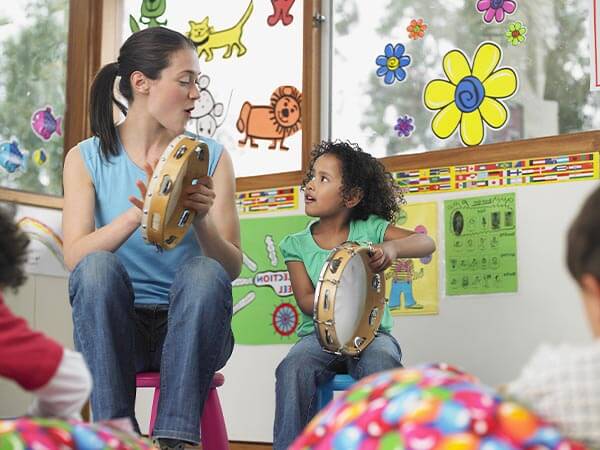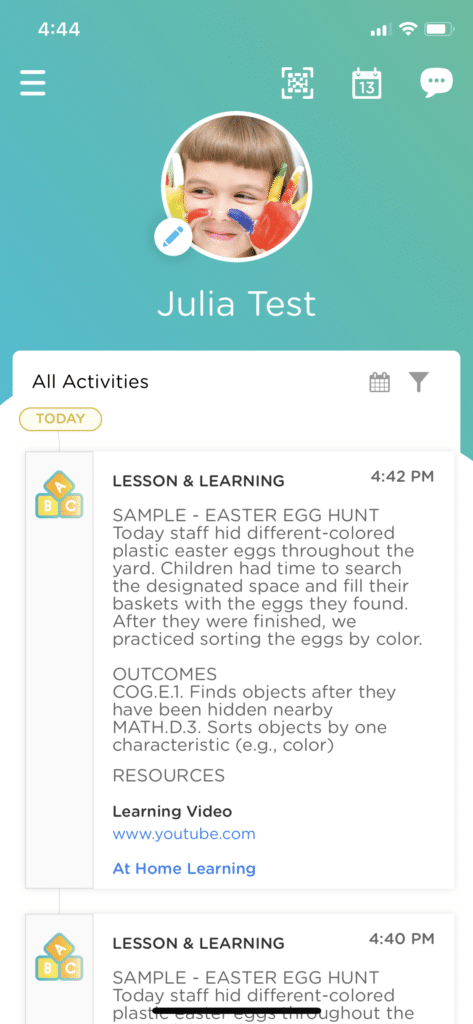
If you’re just starting out as a child care educator, or if you’re looking to make a new move in your career, you might be wondering what makes a good child educator. You may have warm memories of a special teacher who made a difference in your life, and want to know how you can do for kids what that person did for you.
Or maybe you’re hiring new educators for your child care center and you’re searching for a comprehensive list of what to look for so that you can recruit high-performing staff members for your team.
This week’s blog post will go into detail on the 10 most important traits of an amazing early childhood educator. I will explain what each trait is and why it’s important for early childhood educators to cultivate these qualities in themselves and their colleagues. I’ll also provide examples of how these traits are expressed through the actions of educators in the child care environment.
10 Traits of an Amazing Early Childhood Educator
Respectful & Inclusive
As a child care educator, you work with children from many different backgrounds and walks of life. This diversity is an opportunity to learn about other cultures, lifestyles and circumstances. Respectful, inclusive child care means understanding the needs, values, challenges and abilities of each child so that they are all treated equally.
For instance, a great child care educator will make a special effort to give children with disabilities the same learning, socialization and play opportunities as other children. Other examples of inclusivity could include taking the time to understand a child’s cultural background by listening to their parents, or making sure activities and homework are accessible to kids in all socioeconomic circumstances.
Free Template
Child Care Staff Evaluation & Assessment
This free template helps ensure you cover all your bases when you review your child care staff’s performance.
Caring
It’s likely you became an educator because you genuinely care about kids. Caring teachers show concern for kids’ wellbeing and want to comfort and nurture them. Cultivating this quality of caring is one of the most important traits of a child care educator.
A caring teacher demonstrates empathy for kids, taking their needs and concerns seriously and offering a safe space to express themselves. They take the time to understand kids’ perspectives before reacting. They work with other staff toward a culture of care, one that will teach kids the value of empathy as well.
Caring also reflects in self-care. Take time for yourself and watch out for compassion fatigue — that way, that you can bring your best, most caring self to the classroom every day.
Enthusiastic

Think about the best teacher you ever had. Chances are, it’s someone who was genuinely excited about their subject, and that enthusiasm transferred to their students. It is widely recognized that enthusiasm is one of the top qualities of a great teacher.
You can improve outcomes and get kids excited about learning by:
- conveying your passion in your tone of voice and body language
- demonstrating the value of what is being taught through real-life examples
- encouraging student engagement, such as questions and comments
- responding positively to signs of curiosity and interest.
A love of learning is contagious, and an enthusiastic child educator motivates kids to give learning their all. In fact, scientific research consistently shows that teacher motivation is a strong predictor of student success.
Organized
If you’re an organized teacher, you’ll be able to create lesson plans and stick to them while efficiently meeting the needs of kids in your care. Organized teachers have well-run classrooms, handle unusual situations with aplomb and pass on organizational skills to kids.
Planning ahead is the cornerstone of organization, including making sure classroom essentials are in stock and having carefully made lesson plans and curriculum. Other top organization tips include:
- prioritizing essential tasks
- digitizing documents to cut down on clutter
- having a method to track students’ progress against key milestones
- and establishing routines for yourself and your students.
A well-balanced routine cuts down on your mental load, so you can free up space to focus on kids’ wellbeing and success.
Diplomatic/Compromising
Diplomacy is an essential trait when working with other people. Communication, understanding and compromise are some of the key social skills we teach to our students — and modelling these skills yourself is an important step to a thriving career.
Diplomacy means being able to:
- find common ground and connect with others
- moderate conflict to prevent escalation
- find win-win solutions, where everybody comes out ahead.
When handling conflict, remember that you and the other parties are all working toward the same goal of educating happy, successful kids. That way, instead of opponents, you can see anyone instead of seeing those who you may come into conflict with – such as other teachers or parents as opponents, you view them as friends with different opinions, and find a way through that satisfies everyone.
Responsible/Conscientious
Caring for kids can be unpredictable. Most children are still learning appropriate behavior, and they need your guidance to help them gain social skills and promote a harmonious classroom. They also need you to look out for their safety and security, from creating a safe environment, to vigilantly tracking students’ locations, to handling emergencies.
Being in charge of youngsters, in other words, means being responsible and conscientious. You’ll need to know what policies are in place and why it’s important to adhere to them carefully. You must be reliable and put safety first.
To be a conscientious early child care educator, take accountability for your actions, follow and enforce the rules, and take initiative in setting a high standard of conduct for staff and students alike. That way, the children in your care, along with your colleagues will know they can always count on you.
Social/Outgoing
Early childhood educators spend all day working with people — a whole room full of little, energetic people. An outgoing, social personality is helpful in commanding their attention and harnessing that energy toward learning and growth.
You’ll want to be vivacious, friendly and welcoming, with a positive demeanor. The best early childhood educators have an inexhaustible spirit, and feel energized after spending the entire day with excited kids.
Your outgoing nature will help you play, sing and laugh with kids to get them excited about attending child care, maintain a team-oriented atmosphere with colleagues, and be a keen classroom ambassador to parents. The outcome? A happier community for everyone.
Patient/Persistent
Any group of students is made up of diverse personalities, with varying interests, desires and needs. And kids may not always behave exactly as you expect. All of this points to patience and persistence as virtues of the successful educator.
A patient teacher practices understanding of individual students’ abilities, and lets them progress at their own pace. They adapt to different situations easily, and let little things roll off their back. Sometimes setbacks happen, but persistence means trying different strategies and having the endurance to overcome obstacles until you see your goals through.
When you adopt a patient and even temperament, your classroom environment will follow. Kids will find it easy to relax and love learning, and they’ll take cues from your can-do attitude.
Creative

Every good educator wants engaged students. Boredom in the classroom is to never a good thing. As a child care educator, you must nurture both your students’ creativity and your own to keep the kids in your care interested.
To develop your creative aptitude, be willing to try new things and accept different perspectives. Keep up with professional development, such as by attending conferences. Don’t settle for the “same old” — think about how you could put a new twist on old activities, or apply what you’ve learned professionally to your teaching.
Creativity in the classroom has more benefits than just making learning fun. Creativity is at the heart of problem-solving, allowing you to take on challenges without hesitation. And it will help you develop new learning opportunities for kids, so that your teaching will always be its best.
Idealistic/Value-Driven
Surveys find that people become teachers for very worthy reasons: 93% of teachers say they chose their career to make a difference in children’s lives. That kind of idealism is at the core of a great early childhood educator.
Value-driven early childhood educators know that early life experiences are crucial in a child’s development, and understand that they have an important responsibility to form those experiences into positive ones. They believe in the value of education in maximizing the inherent potential in every child.
Holding on to your values as an educator is key to overcoming challenges and maintaining your enthusiasm even when things get tough. And kids will notice — your values and idealism will manifest in all the other qualities of an outstanding educator I already described.
Procare Solutions Help Child Care Providers Reach Their Maximum Potential

Every child care provider wants the best possible outcomes for the kids in their care. To get there, you need to be the best early childhood educator you can be. You want to spend the most time you can educating kids, but sometimes other things get in the way.
Procare’s range of child care management solutions help early childhood educators streamline administrative tasks, leaving you with more time in the day to focus on your students and develop the outstanding traits that support child learning outcomes. Procare lets you simplify every aspect of running your center, from complying with state learning standards, to managing security and driving parent engagement.
Ready to free up more of your time so you can reach your full potential as a child care educator?
Request a Demo
Request a demo and talk with one of our friendly Procare experts to get a tailored child care solution for the unique needs of your business.




